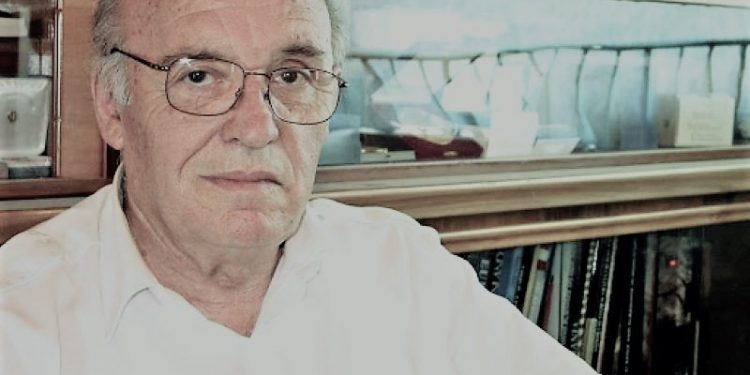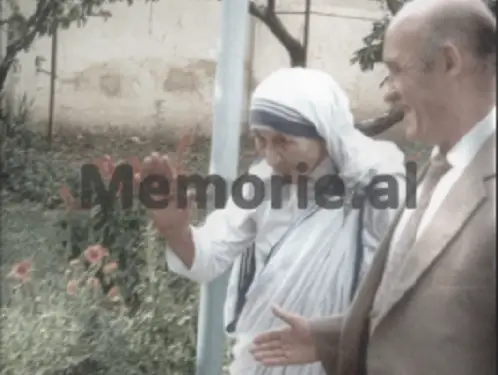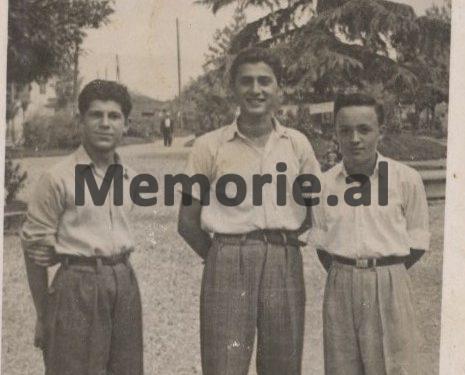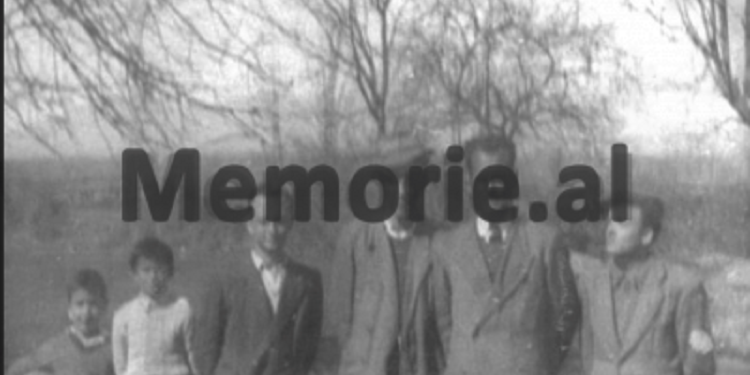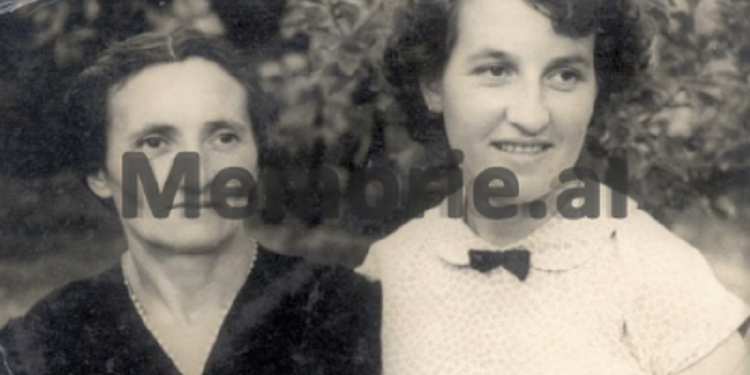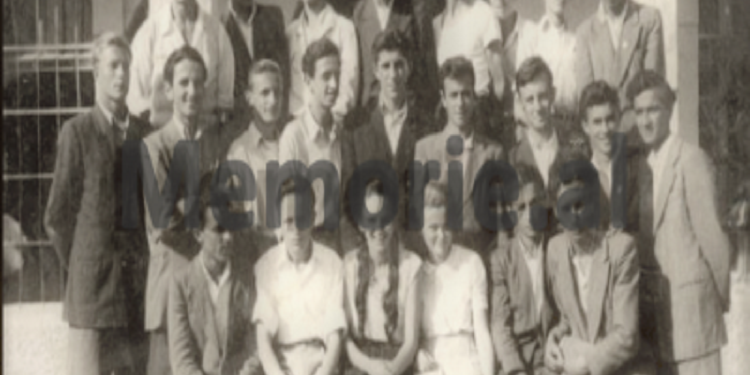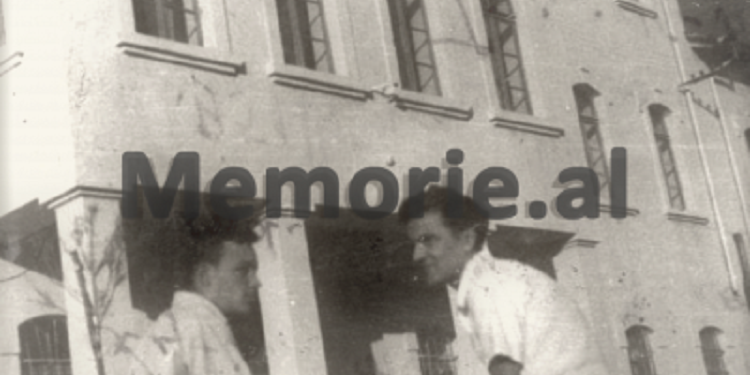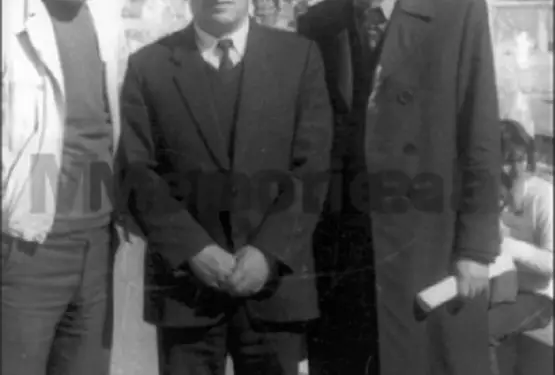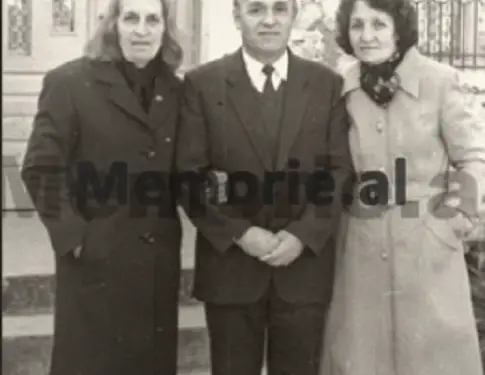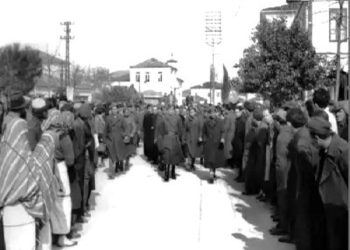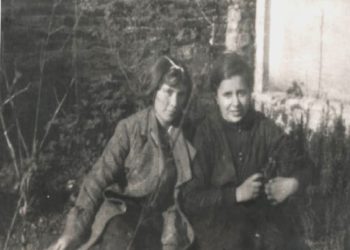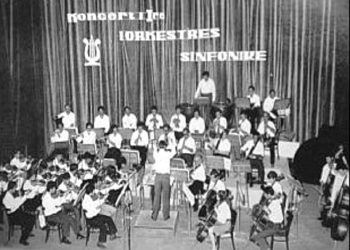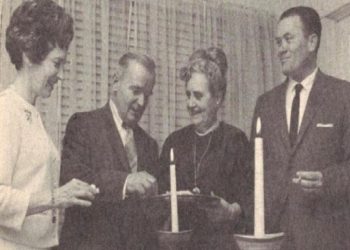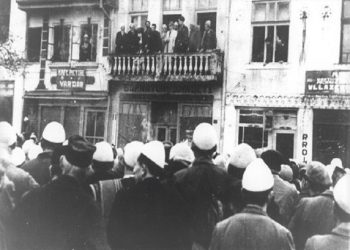By Peter Arbnori
Memorie.al / Pjetër Arbnori was born on January 18, 1935 in the city of Durrës, (where at that time his father, Filip Toma, served as an officer of the Gendarmerie of the Kingdom of Zog), while the origin of their family is from Shiroka , by the Shkodra lake. His father, Filipi, as a gendarmerie officer, participated in the resistance against the Italian occupation on April 7 in Durrës, led by Abaz Kupi. In 1940, their family settled in the city of Erseka, (where Filip Toma served in the units that participated in the Italo-Greek war), and at that time, Pjetri attended the first grade in the “Mõsonjëtoren” of Korça. At the end of 1940, their family (without his father, who was serving in the war), returned to Shkodër, where they bought a house in Shirokë and Pjetri attended the local school. In 1942, Pjetri’s father, Filipi, was killed in an attempt with a partisan unit, the squad of Teki Kolaneci, Petri Dumas and Nevzat Haznedari. In the meantime, Pjetri continued his studies and attended the third grade of primary school at the Saverian College in the city of Shkodra and then finished high school at the “29 Nanduer” gymnasium, where he was registered under the name Pjetër Filipi. In the years 1949 – 50, Pjetri organized with some friends and peers who printed and distributed tracts against the communist regime in power, as well as collected and transported the tracts of the “Free Albania” Committee that were dropped from airplanes. After finishing high school, Pjetri was appointed to work as a teacher in an eight-year school in the deep area of Dukagjin. Then he was called to perform the mandatory military service, where, due to his family history, he performed it in the agricultural work departments, at the Xhafzotaj Farm, and then at the SMT of Shijak. In 1957, when the class war had abated a little (as a result of Russian influence after Khrushchev came to power), Peter was given the right to continue by correspondence at the State University of Tirana and after graduation, by decision of the Party Committee in Durrës, he was appointed a literature teacher at the Agricultural High School in Golem, Kavaja, under the name Pjetër Toma. In 1962, Pjetri was arrested by the State Security, accused of having wanted to form a social-democratic party together with a group of friends (including Uran Kalakulla, Tanush Kaso, Zeqir Koçi, etc.), which for which he was initially sentenced to death and then commuted to 25 years in prison. After 18 years in prison, which he served in Burrel, he was sentenced to another 10 years in prison. In the most difficult conditions in prison, he wrote a large part of his literary work. He was able to be released from prison only in August 1989, serving a total of 28 years in political prison, being considered as: “Mandela of Albania”. In January 1990, he participated in the demonstration held in the city of Shkodra, for the fall of Stalin’s bust. While at the end of 1990, he engaged in democratic processes and was one of the co-founders of the branch of the Democratic Party in the city of Shkodra. From 1991 to 2001, he was a deputy in the Assembly of Albania as a representative of the Democratic Party, and from 1992 to 1997, he was the Speaker of the Assembly. Despite his intense dedication to politics, he did not fail to cultivate his early passion for literature. Also, during these years, he has been engaged in various historical studies, publishing many books (over 25 books) in the genre of literature as well as historical essay memoirs, etc., for which he has been appreciated both internally and externally country, giving you various national and international awards. Pjeter Arbnori passed away in a hospital in Naples, Italy (on July 8, 2006), where he had gone for treatment, after a cerebral hemorrhage. Among other things, Pjetër Arbnori has been awarded many titles and medals, such as: “Teacher of the People”, “Torch of Democracy”, “Grand Officer of the Order of the Pleiades”, “Mother Teresa” Order, “Gjergj Kastrioti Skënderbeu” . etc. The part that we have selected for publication here is excerpted from his autobiographical book “To remain human”, where he also describes his suffering in the prisons of the communist regime of Enver Hoxha and his successor, Ramiz Alia.
COMPLAINT LETTER FROM BURREL PRISON
Chairman of the Presidium of the People’s Assembly
RAMIZ ALIA
Tirana
Systematically violating the legality and internal regulations of the Burrell prison, the command forced me to start a hunger strike for 7 days and it is not known when I will end it.
- For the 23 years I’ve been in prison, based on the norm (49 grams of calories, 6.8 grams of fat per day), we’ve had one day of rice soup, one day of pasta soup, one day of bean soup. For a year, the command has cut our beans.
There has always been beans in the warehouse (perhaps retail), but they have not given it to our cooks and lately they have hidden it altogether. It is not fair that the police eat our ration. Where will I, as a prisoner, get the mineral proteins that the law provides me?
- Systematically, the command saves on our backs and in favor of the budget, giving us rotten or very cheap greens (for months during the year we are given pumpkin worry). The financial rule provides that the average cost of greens throughout the year is 1.8 ALL per kg., while we are given those that usually cost half the price, while potatoes and onions in winter are “events”.
- The deputy director of prison camps, Mitat Bare, in the presence of the head of the Department of Internal Affairs and commander Ismail Musta, read us the decision of May 28, 1983, “On the abolition of personal cooking (we are forbidden to make even a cup of tea with newspapers, when we have the flu) and the restriction of food (1-2 kg) and fruits and vegetables (3 kg per month) from the family. We were told that this is done “for the relief of our families”.
He expressly read:
“The prisoner is allowed to take from his family only 1-2 kg per month of sugar, or butter, or marmalade, or halvasi, or other cookies, as well as a shop will be opened near the prison where there will be salami, pie, preserves, prepared coffee, others”. After a few days, the commander read us and showed us a new regulation where the decision of May 28 was turned upside down, certainly to the detriment of the prisoner.
It said: “it is allowed to take from the family 1-2 kg of sugar, butter, marmalade, halva and biscuits (the word other has disappeared), as well as to buy near the prison shop, for daily consumption, salami, pies, preserves, coffee prepared; when there is an opportunity”. So surprisingly, the word “others” was removed again and a magical word “when there is an opportunity” were added, which for the commander means: “when I want you”! In addition, we found another clause, unread by Mitat Bare, which states that:
“In the store you can only buy 3 kg fruits and vegetables per month, if we have not received them from the family, which seems to me to have nothing to do with the relief of the family, which was used as a motive for the decision of May 28. For weeks, the store was stocked with coffee, cookies and jam. Once every fifteen days, we were given 100 grams of salami, which disappeared again. Of the 2 kilograms allowed, only sugar was sold, others, they said, were not available.
I understand that there may be shortages in the market: how come our list only includes items that are not found. We asked to replace the items that were not found, with curd, cheese, or a drop of oil, enough to add to the soup of the kettle, but the commander answered us: “You will never eat curd, cheese and oil “. The guards made fun of us: “Eat jam and cookies, drink coffee”!
But is there anyone in Albania who lives on cookies and jam! How many times have I read in the press of your books, the words of Marie Antoinette in 1789: “Why are the people shouting? – They want bread! – But why don’t they eat cookies”!
For me, the supply system, which the commander has established, is a robbery of our minimum income, by the forced sale of articles that do not go to the market. The regulation allows cans. The commander allows only apple jam and pickled peppers. It is said that the “Ali Kelmendi” combine produces over 100 types of canned goods. They can’t all come, not even half, but 10-15 types (groceries in a jar, cottage cheese fritters, canned olives, sardine boxes, meat boxes), can’t they come?
- Under these conditions, families sent packages. They started me with a pound of powdered milk, half a pound of cheese and two pounds of onions. The package was returned to me, like many others, as if the milk, cheese and onions were radioactive substances. How is it possible that condensed milk is allowed in the store and not allowed by the family? In meetings, it happened that a watermelon was split in half, half returned to the family, half to the prisoners. The hides were brought in to the weight of 3 kilshi.
Another one my wife brought 3 kg. olives and they returned it, saying that olives are strictly forbidden. I opened the dictionary of the Albanian language and it turned out that you are the fruit of an evergreen tree. What does the command consider the olive, a mineral from the underground or a seafood product that does not allow it to enter the chapter of 3 kg. fruits and vegetables?! They gave me back ten meatballs and three boiled eggs, which my mother had brought me to the meeting, although they were within the weight of 2 kg per month.
- We have been systematically eaten up the 2 hours of airtime that the regulation provides us. Anyone, when it’s his turn, eats you for 20 minutes and threatens you if you complain. The clock is hidden in the office, but the speaker in the room told us the lost minutes. A small matter, a visit, a departure to the hospital, a meeting, a call to command, all these are causes to cut off our vital air. (We live in a room 8 by 5 m. 22-24 men lit by a 40 watt lamp, the same as those of the poor and dungeons).
I’m not talking about closings for weeks, when the command refuses to give us an hour in the canteen so that the room can be aired and we can be seen. Even when we ventilate, most of the 60 minutes are spent doing other work: cleaning the room, queues in the bathroom, queues for shaving and haircuts, queues for the daily supply at the store, the bathroom, laundry. So effective ventilation, if you are generous with the account, lasts about 30 minutes. You can never find more than 8-10 people walking around in the courtyard, others are busy with anti-ventilation work.
- The needy is allowed twice in 24 hours for 20 minutes. There are four splits and two taps. 22-24 members of the room are forced to lock themselves inside. If you put your head or body out the door, due to the great compression and the impossibility of movement, you are under the threat of the dungeon and the cutting of correspondence for 3 months, not a theoretical threat, but often practiced.
Each person has 1’30” on tap and three minutes on tap. Can I wash my feet, hands, teeth, fill water to drink, pour and rinse the urine gourd for 90 seconds. The command has excess time at dinner from 6 to 9, but refuses to add minutes. Prisoners are forced to return with unwashed hands from the toilet, due to the spread of stomach diseases in the prison.
In the room, most use gourds of urine and hold plastic bottles over their heads, when they feel bad. During the 23 years that I have been in prison, there have been periods when the door was opened to us at midnight, while now they often refuse us even during the day, forcing people to go out in need, in the eyes of men.
- In the regulations, we have bathrooms once every ten days and laundry once every ten days. In practice, the bathroom does not work for months, but even when it is turned on, not everyone can do it within an hour (24 people in three cabins without a door, for 60 suspicious minutes). The command can find free time to do these jobs, outside of the air time, as it was before, but it won’t.
- We have asked the commander since July for disinfection, for bedbugs and flies. “Will have”! – said. Only in September when typhus, a contagious disease, occurred in room 6/1, only one room was disinfected.
- We officially have 3 nurses. They are practically useless. Once a year or every two years, a person is laid to rest, a “companion” is also put on him, for ten days (the fate of the “poor”) and then they are left and dusted, although there are many sick and incurable people here. Once a year or every two years, a health commission comes from the Ministry of Internal Affairs, the doctors put their heads in the room, twist their noses from the smelly air and leave leaving a report that everything is fine.
Rarely, we do an x-ray: everyone comes out healthy. Once, a few years ago, Skender Alia, who did the radioscopy, also appeared “fat”. It used to be that one or two people were given a report of 10 days of milk, which was expected after 7 days. I have read a lot, but how can there be any chest disease that can be cured with 7 spoons (250 grams) of milk!
I have written about some of these facts to the command, I have also complained verbally, but I have always received negative answers.
In these circumstances, I was forced to announce a hunger strike, demanding respect for the legality and implementation of the regulation.
From the first day they brought butter to the prison shop. Ordered for months and flatly rejected by the commander.
They called me the next day again: “Why don’t you break the strike, they brought the butter”, they told me. “I didn’t go on strike for butter; I’m not a gentleman to live on butter, biscuits and jam. It would be a shame for me to strike for butter. You imposed that on me, I want to buy a spoonful of cottage cheese and a spoonful of oil, to add to the soup of the kettle. I am on strike for the implementation of the regulation”.
On the second day, canned fish arrived, which had disappeared in time, on the third day, cheese (100 gr. per person) and salami, which had been missing for so many days (500 gr. per person), arrived, although the commander had said: “You don’t have never ate cheese and cottage cheese”. How come all these things were found in three days?
It’s just that from the regulation posted on the wall, the distortion made for the purpose of the decision of May 28 has not yet been removed, which makes me suspect that, after two weeks, the command may again mock the slogan: “Drink coffee, eat cookies and jam”.
The nurse of the ward, non-commissioned officer Kamber Lybeshari, does not answer you or visit you, if you did not call him “Mr. Doctor”! I was hospitalized twice, in 1969 and 1970, when I had broncho-pneumonia and a heart attack. Both times he did not force me, but he left me with the kettle soup for two weeks.
Instead of nursing food, I was introduced to provocateur and the well-known professional witness Muharrem Koliqi, who recorded all the words he said himself (I couldn’t speak at all because I had a heart attack) in my name and after 10 years, in 1979, I was re-sentenced to another 12 years, based on his testimony. This is why infirmaries are mainly used.
Today, I have in mind the poor villager Hilmi Gocaj, who had been in prison for 19 years and was only a few months away from being released. He had a stomach ache and complained to Lybeshar every day. On the last day, he said: “Yes, I am bad, doctor, please give me medicine”! You want milk; you want milk, that’s why you do it”! – replied Lybeshari cynically. At dinner he became very ill.
The door was banging all night with force (there are clear signs on the door of room 10, today the canteen, but no one opened it). In the morning Hilmiu died. Kamberi came with the cleaning nurse and they took him to the infirmary. They made an “accurate” record, which stated that: he died under medical care. They called the tow truck and everything was wrapped up nicely.
PROLOGUE OF THE ROMANCE “BEAUTY WITH THE SHADOW”
To put me in the cell, the prison operatives always found the most absurd pretexts. There were years when it was not enough to enter the dungeon in winter, which was my permanent “ration”, but also in spring and summer. One day at the lunch call, NCO A.K., a sadistic policeman with alligator teeth, came and screamed. “Why did you hang your hat on the wall? Why did you pierce the wall? Where did you find the nail? Why did you break the rules”? I calmly told him that the plaster had been punctured; I had stuck a match pin in it and hung my hat.
After he sentenced me to a month in the dungeon, he returned and told my friends with all satisfaction: “I killed that priest of yours in the dungeon.”
And it was not your fault! Peter yes, Shkodran yes, with glasses, bald, in black pants, day and night with thick books in my hands, I, definitely, for his eyes, I should be a priest.
When I left, I wrote an ironic letter to the Minister of the Interior, Kadri Hazbiu, where I told him that: I am a literature teacher by profession that I graduated from the Faculty of Philology of the State University of Tirana, which, as far as I know, did not yet have a branch for priests.
This letter cost me another month in prison, with the threat of new punishment officially made by the director of prisons B.H. and the prison commissioner A.M., who barked one in a thick voice, the other in a thin voice. I barked that I had never heard anyone speak like a human.
There were times when I was punished for wearing my clogs crookedly, for laughing out loud, for reading at night. Once they couldn’t find an excuse.
When, one day, the policeman A.P. comes and he tell me: “You are assigned to be in charge of the room.” I flatly opposed it. I was sentenced to a month in prison for disobeying the order. I went on a hunger strike. I was naked, on the cement. When we went out to wash our eyes and drink water, the doors were open and a fellow convict in front of me would look greedily at my untouched bread rations, piled up against the wall, he joked to the guard. How did you not make a mistake, guard, to switch dungeons with Peter?
One day I found two newspapers “Zëri i popultil” in the tap, the only newspaper that we were forced to read every day after eating. I was overjoyed. I read them in one breath, and then tossed them to the edge of the cell.
Voluntary hunger is felt only in the first days of the strike, and then the body feels quite light. Lying on the cement, eyes closed, I was thinking, remembering, dreaming. If I had a letter I would write something, if I didn’t have one. The trained prisoner always does well to have a few essential tools concealed: a razor blade, usually a sharpened quill, a thread of pe, two matches, a zig-zag and a pencil with him.
I also had a bullet one centimeter long, inserted into the seam of the pants trigger where no man could find it even if he checked me a hundred times. I took the newspapers again to read them, like someone who has nothing to do. Suddenly my eyes fell on the white pages of the newspaper. What a miracle!
I started to write in them. A torturous job, try writing on hunger strike, lying flat on the cement, with a short pencil that could barely be held between the fingers, worried that the counter would open and the police would look at me. Waves came to me…! Freedom…like a beauty of others, guarded by bewildered shadows. And I ran away to walk in the mountains. Memorie.al




